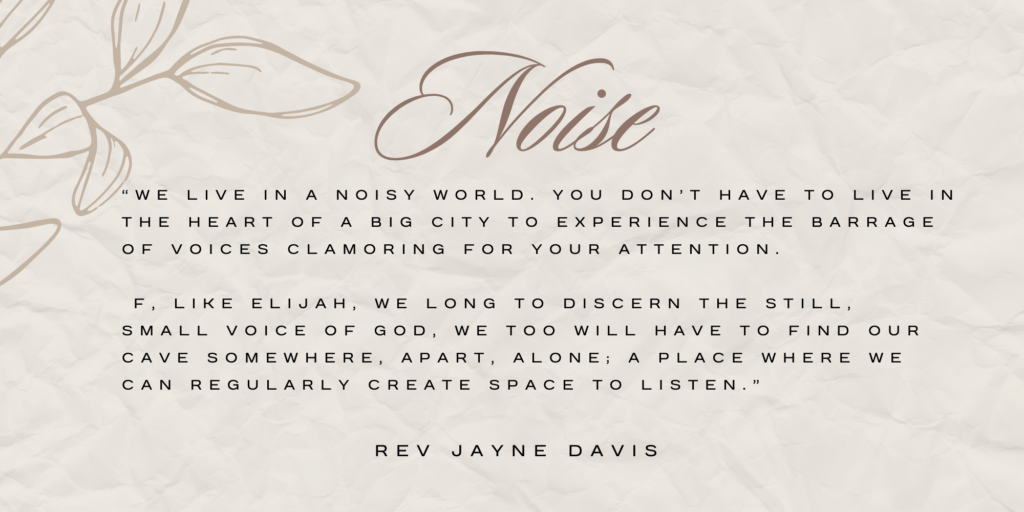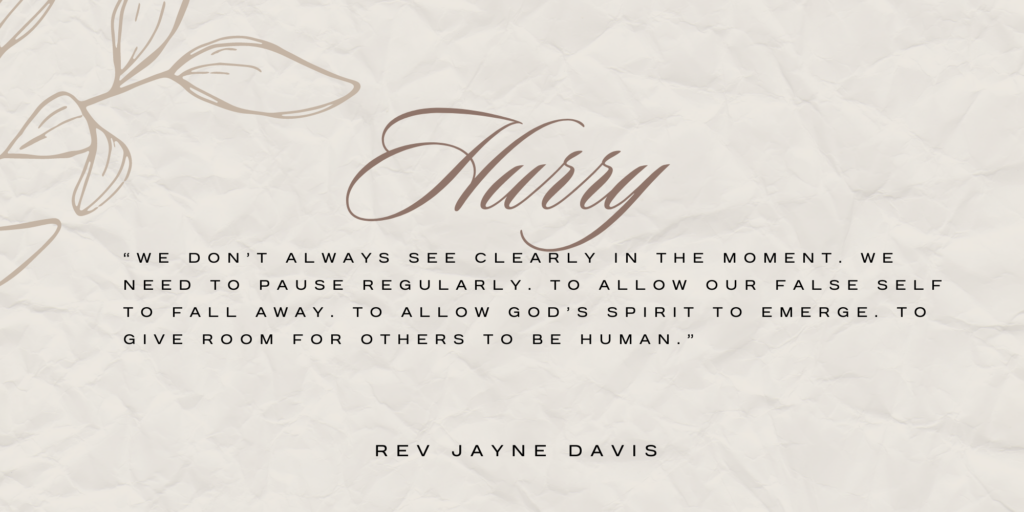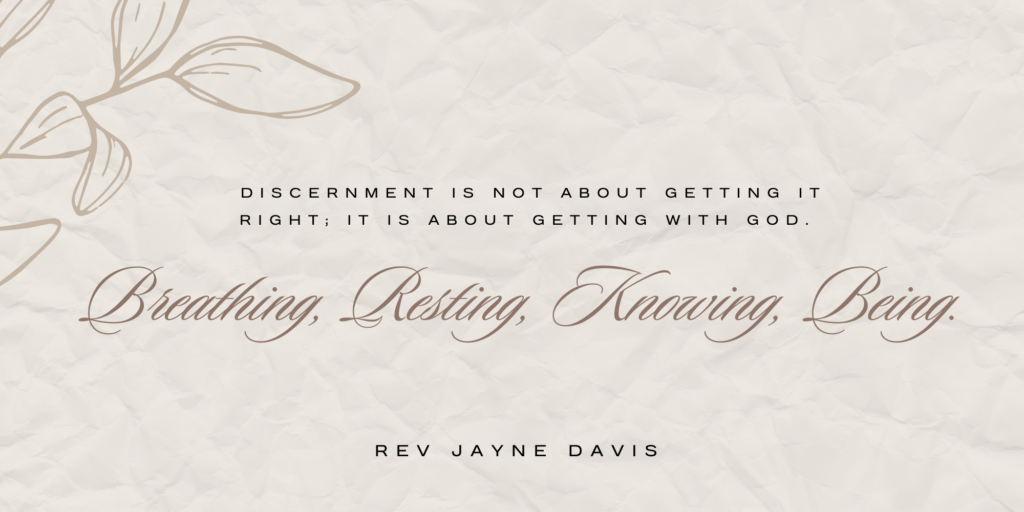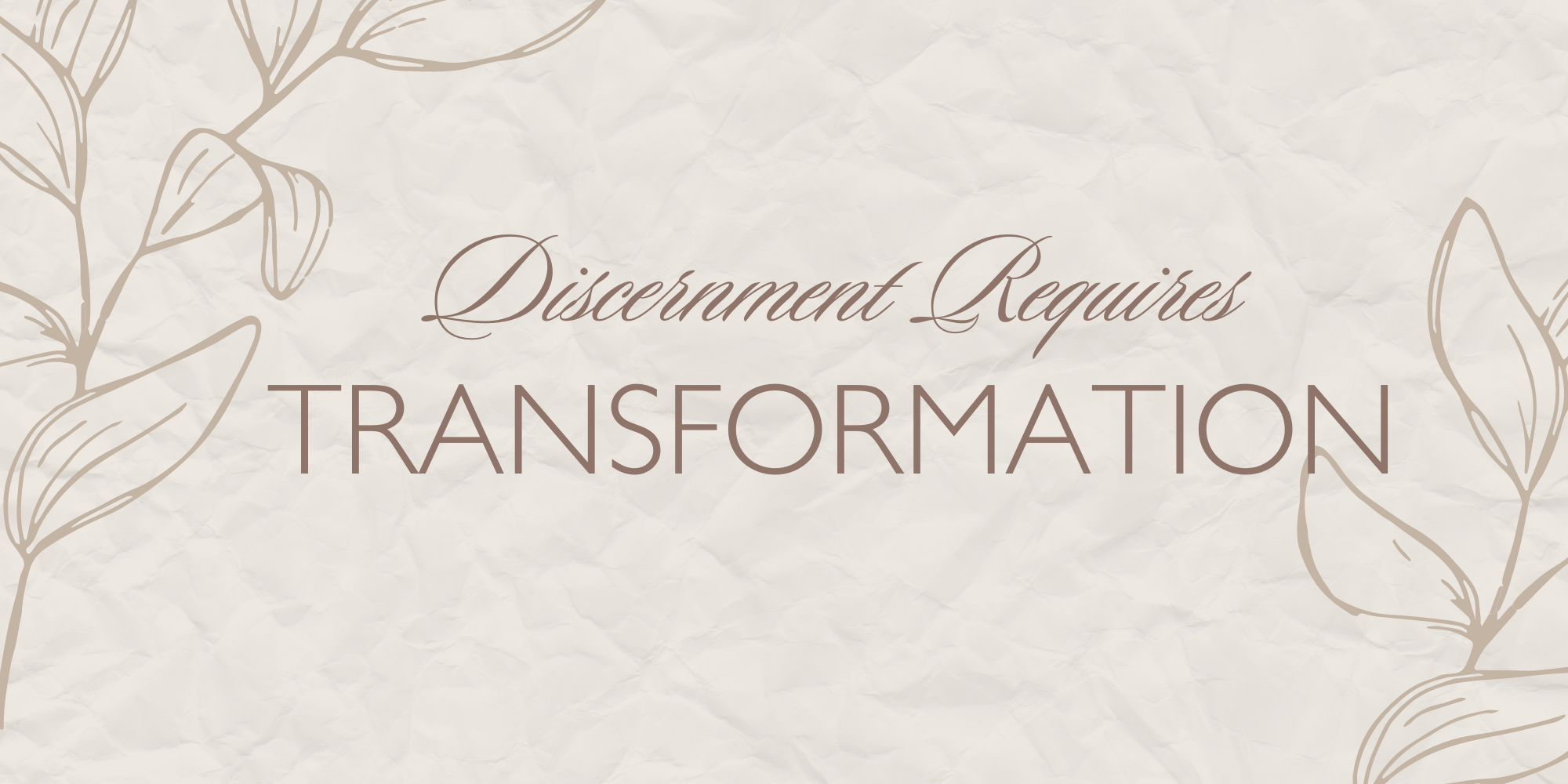“Do not conform to the pattern of this world, but be transformed by the renewing of your mind. Then you will be able to test and approve what God’s will is – his good, pleasing and perfect will.” – Romans 12:2
I often think of discernment as the ability to sense God’s leading in a particular situation. A choice that has to be made. A word that needs to be spoken or not spoken. A sense of direction when I come to a fork in the road or an obstacle in my path.
And discernment is that, in some measure. Aligning our will with God’s at a particular point in time.
But Paul, in his letter to the Romans, is emphatic that discernment is so much more.
Discernment requires transformation. Our personal transformation. The renewing of our mind.
It’s not just about a decision before us in the moment, however important or holy it may be. It’s about becoming a person who recognizes the patterns of life around us and within us. A person who recognizes the movement of God in the world and is changed by it.
Discernment challenges all of the ways we have been conformed to our culture; our thoughts and beliefs about what is good and acceptable and true for us and for others. It exposes the reactions and responses to people and situations that have been shaped by our fears and our deepest needs which operate unconsciously, but consistently, beneath the surface of daily life, guiding our choices along a well-worn path.
Decision making allows us to stay as we are. Discernment requires intentionality and endurance.
It is a journey of becoming sensitive and responsive to God’s presence and choosing daily accordingly.
If the path were easy, we would follow it gladly, wouldn’t we? But there are obstacles that get in our way, again and again, and they are deeply rooted in our way of being. Consider these three:
Self-deception, Noise, and Hurry.
They are so ingrained in us we will choose to side-step dealing with them most of the time, which, sadly, is why, at the end of the day, the year, the lifetime… many decisions have been made, but little transformation has occurred. Our mind has not been renewed.
Self-deception – How do we get out of our own way?
There is a great quote that has been attributed to many authors, from the Talmud to Emmanuel Kant. Perhaps it is simply a truth of the human condition that keeps emerging from generation to generation.
“We don’t see things as they are; we see things as we are.”
We all see the world through a particular lens.
In 1801, Rev. Sydney Smith wrote in a sermon,
“It is, then, a matter of sovereign necessity, before we decide on great and momentous questions, which affect our own happiness, and the peace of the world, to make a wise, and virtuous pause, and review, with an honest severity, those peculiarities of disposition, situation, and education, which may communicate an unfair bias to the mind, and induce us to decide, not as the truth of things is, but as we ourselves are.”
Have you ever paid attention to your own impulses and motives? Why do you react the way you do in situations or respond so strongly when certain issues come up?
Truth is not truth simply because it concurs with our strong certainty. Sometimes our passionate reactions are God’s way of getting our attention. To shed light on something within us that may actually be a barrier to our discerning God’s desires for us, a stumbling block to transformation.
The spiritual practice of Examen is a way to put ourselves before God each evening. To prayerfully review each day, inviting God’s Spirit to help us to notice where we felt God’s nearness and when we felt God’s distance. What reactions did we notice in ourselves throughout the day? Over time, patterns of thought and behavior that distance us from God become visible, as do choices and responses and circumstances that bring us the peace of being aligned with God’s Spirit.

Noise
We live in a noisy world. You don’t have to live in the heart of a big city to experience the barrage of voices clamoring for your attention. If, like Elijah, we long to discern the still, small voice of God, we too will have to find our cave somewhere, apart, alone; a place where we can regularly create space to listen.
But there is another kind of noise that is a stumbling block to our discernment.
Recent brain research has found that the brain is constantly predicting what is going to happen next, influencing how we experience situations and people. This can lead to cognitive biases in perception. We will see what we have already decided we will see. We will predetermine our ‘discernment,’ so to speak.
To help to release the grip of some of our cognitive biases, they say, we need to control our exposure to biasing information. Echo chambers. Group think.
Group think releases us from the hard work of discernment. It shortcuts pondering and wrestling with the challenging gray areas of life. It creates a honeycomb of boxes into which everything must fit… and never touch. It outsources decision making to others, who generally do so with a fair dose of anger and hostility to keep the group tightly together. We very well may be transformed in the process, but not into the likeness of Christ.
The spiritual practice of Meditation can help us to keep a check on our biasing input and keep us on the path of the renewing of our mind. Consider Philippians 4:8:
“Finally, brothers and sisters, whatever is true, whatever is noble, whatever is right, whatever is pure, whatever is lovely, whatever is admirable – if anything is excellent or praiseworthy – think about such things.”
Memorize it. Let these words be the counterbalance and the filter to all the noise that seeks its way into your mind and heart. … And the God of peace will be with you.

Hurry
God does not travel at the speed of hurry. Rarely does God appear interested in parsing out discernment like the hospitality table giving water to marathon runners, who grab hold of the bottle without slowing down or missing a step.
Discernment has a rhythm, a heartbeat, a breath.
We don’t always see clearly in the moment. We need to pause regularly. To allow our false self to fall away. To allow God’s spirit to emerge. To give room for others to be human.
In silence, particularly in the spiritual practice of Contemplative Prayer, we are reminded that we bring nothing to God. No words. No good deeds. No resume to make us acceptable. We are simply received and loved by the one who knows everything about us; who knit us together in our mother’s womb. We are not on the way somewhere; we simply are.

Discernment is not about getting it right; it is about getting with God.
Breathing, resting, knowing, being.
Renewed.

Leave a Reply